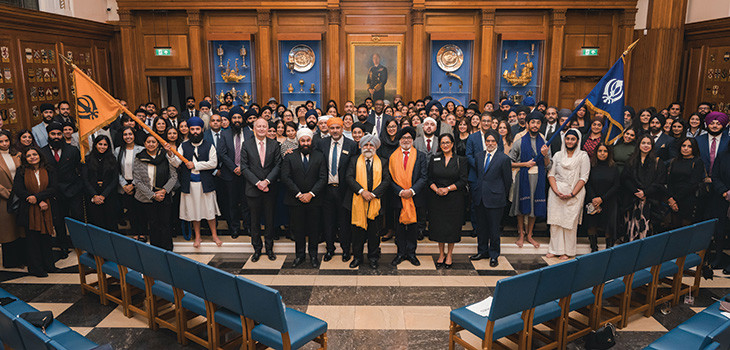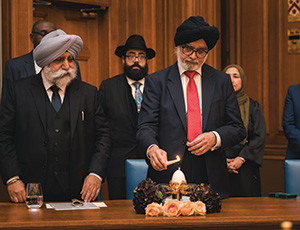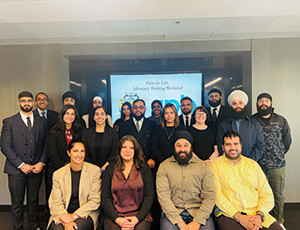*/

Baldip Singh, founder of Sikhs in Law, explains how the association is nurturing legal minds and seeing an outstanding level of interest in its forward-thinking events
In 1965 when Sir Mota Singh QC (as he later became) came from Kenya to the UK with the aim of practising at the English Bar, it was difficult to overestimate the challenges he faced. According to his obituary in the Times newspaper, he made hundreds of handwritten applications for legal jobs which were all either ignored or rejected. Despite having already qualified as a barrister in England and established himself as one of the leading advocates in Nairobi, that stood him in little stead with his applications in the UK. While the Bar has come some way in addressing diversity and inclusion challenges, in many ways it has become even harder to pinpoint discrimination and unspoken biases.
With hundreds of years of unsociable working hours, a drinking culture and old boys’ network, a number of groups carved out a space within the Bar in order to preserve their religious and cultural identities. Associations like the Association of Muslim Lawyers, Hindu Lawyers Association and the International Association of Jewish Lawyers and Jurists have done phenomenal work with, and for, their respective communities in promoting diversity at the Bar.
In late 2020, during COVID, I founded the Sikhs in Law Association with the aim of promoting, empowering and recognising Sikhs in the legal professions. In April 2023, the governing council was inaugurated in the UK Supreme Court. Lord Leggat, who gave the opening speech, remarked: ‘I am glad to be able to express on behalf of the Court our strong support for your Association, its Council and your outreach work… You have the ability to play an immensely valuable role... to encourage and inspire young people in the UK Sikh community to see themselves as future members of the legal profession [as well as] the power to provide support, mentoring and encouragement to other members of the UK Sikh community at different stages of their careers – particularly at critical points in mid-career such as when someone may be contemplating a career change, such as applying to become a judge.’
Sikhs in Law has rapidly grown to become the largest network of Sikh legal professionals in the UK, committed to promoting the rule of law and civil liberties while remaining independent and non-political. The organisation seeks to assist its members and students in professional development, raise the Sikh profile in the legal sphere and drive initiatives from the classroom to the boardroom. Membership is open to anyone who wishes to join.
Sikhs in Law emphasises four core values of honesty, integrity, fairness and humility as set out by the Sikh gurus. Sikh values and customs are preserved in a safe space, with an emphasis on events which are free from alcohol and meat. A student at a Sikhs in Law advocacy weekend said: ‘I am so glad as a Muslim that I can learn and practise the art of advocacy without alcohol flowing around me so freely. I do not drink alcohol and I have always been reluctant to go to Inn dinners for this very reason.’
We also put on family-friendly events. By not asking our members to choose between career development events and spending time with the family, the Association actively encourages and promotes family life. Sharan Kaur Bhachu, Master of Advocacy at the Association and a family barrister at 42BR, is a strong advocate of this particular aspect. As a mother to three girls, she often has to balance the needs of life as a Mum against that of a successful barrister. Being able to attend events with her husband and children, bringing them into the world of the Bar, is a significant factor in balancing these difficult and competing worlds.
This has been a real opportunity to do things differently. What has surprised me is how universal Sikh values really are. All our events are open to Sikhs and non-Sikhs and the take-up by all faiths and those of non-faith has been outstanding.
Within 12 months, Sikhs in Law held 10 school outreach events, placed over 100 students with work placements and mini pupillages, ran numerous panel and networking events at universities, put on a funfair Mela for lawyers and their families as well as advocacy training weekends – all honouring Sikh values. The Association also set up the Sir Mota Singh Mooting competition and the final was held in the Supreme Court on 28 March 2024 presided over by five Sikh silks. These events are aimed at providing a platform to promote those currently in law and those coming up the ranks while also giving them seniors lawyers and judges – who look like them – to look up to. Unifying the Sikh legal family.
Sikhs in Law has also organised exchange progammes with the USA, Canada and India. When I was a student, I could not afford to travel to Texas to work on death row cases. Being able to build international relations with judges, lawyers and silks abroad allows our student members to gain those opportunities that we never had.
These iconic events took place in a year when Sikhs faced issues in taking their kirpan (article of faith) into courts. The Vaisakhi celebrations, held in the Supreme Court, saw council members and guests walking behind the Panj Pyare, in full warrior robes, present with their articles of faith. At the Bandi Chhor event in November 2023, Sikhs in Law proudly sang the Sikh national anthem at the Inner Temple, behind the Sikh Flag standing to attention to the sound of the Nagara (Sikh warrior drums).
We were called upon by the Sikh community to challenge the Bloom Review which considered how government engaged with different faiths. There was an overwhelming view that the report disproportionately singled out Sikhs with no proper basis. Sikhs in Law was able to convene an inquiry chaired by Professor Satvinder Juss, who published a response to the report submitting it in Parliament.
Sikhs in Law stands as a beacon of integrity and inclusivity within our legal landscape. Paul Singh Millan, a solicitor and council member, commented: ‘Looking back over the last year, our impact is breathtaking. From hosting professional networking opportunities to organising family-friendly gatherings, the association has fostered a sense of belonging and support among its members while recognising the importance of family, accessibility and identity.’
And as council member Harjap Bhangal reminds us: ‘Sikhs are a martial race that has, through the centuries, fought to preserve the rights of all faiths not just its own. We embody this ethos and will continue to do the same.’ Sikhs in Law’s focus on school outreach and nurturing the next generation of legal minds, regardless of faith, exemplifies its forward-thinking approach to building a more inclusive and diverse legal profession.
Visit sikhsinlaw.co.uk to find out more.


Above (front row): Puneet Grewal, Sharan Bhachu (Master of Advocacy), Baldip Singh and Mani Singh Bassi, the Advocacy Training Council of Sikhs in Law.

In 1965 when Sir Mota Singh QC (as he later became) came from Kenya to the UK with the aim of practising at the English Bar, it was difficult to overestimate the challenges he faced. According to his obituary in the Times newspaper, he made hundreds of handwritten applications for legal jobs which were all either ignored or rejected. Despite having already qualified as a barrister in England and established himself as one of the leading advocates in Nairobi, that stood him in little stead with his applications in the UK. While the Bar has come some way in addressing diversity and inclusion challenges, in many ways it has become even harder to pinpoint discrimination and unspoken biases.
With hundreds of years of unsociable working hours, a drinking culture and old boys’ network, a number of groups carved out a space within the Bar in order to preserve their religious and cultural identities. Associations like the Association of Muslim Lawyers, Hindu Lawyers Association and the International Association of Jewish Lawyers and Jurists have done phenomenal work with, and for, their respective communities in promoting diversity at the Bar.
In late 2020, during COVID, I founded the Sikhs in Law Association with the aim of promoting, empowering and recognising Sikhs in the legal professions. In April 2023, the governing council was inaugurated in the UK Supreme Court. Lord Leggat, who gave the opening speech, remarked: ‘I am glad to be able to express on behalf of the Court our strong support for your Association, its Council and your outreach work… You have the ability to play an immensely valuable role... to encourage and inspire young people in the UK Sikh community to see themselves as future members of the legal profession [as well as] the power to provide support, mentoring and encouragement to other members of the UK Sikh community at different stages of their careers – particularly at critical points in mid-career such as when someone may be contemplating a career change, such as applying to become a judge.’
Sikhs in Law has rapidly grown to become the largest network of Sikh legal professionals in the UK, committed to promoting the rule of law and civil liberties while remaining independent and non-political. The organisation seeks to assist its members and students in professional development, raise the Sikh profile in the legal sphere and drive initiatives from the classroom to the boardroom. Membership is open to anyone who wishes to join.
Sikhs in Law emphasises four core values of honesty, integrity, fairness and humility as set out by the Sikh gurus. Sikh values and customs are preserved in a safe space, with an emphasis on events which are free from alcohol and meat. A student at a Sikhs in Law advocacy weekend said: ‘I am so glad as a Muslim that I can learn and practise the art of advocacy without alcohol flowing around me so freely. I do not drink alcohol and I have always been reluctant to go to Inn dinners for this very reason.’
We also put on family-friendly events. By not asking our members to choose between career development events and spending time with the family, the Association actively encourages and promotes family life. Sharan Kaur Bhachu, Master of Advocacy at the Association and a family barrister at 42BR, is a strong advocate of this particular aspect. As a mother to three girls, she often has to balance the needs of life as a Mum against that of a successful barrister. Being able to attend events with her husband and children, bringing them into the world of the Bar, is a significant factor in balancing these difficult and competing worlds.
This has been a real opportunity to do things differently. What has surprised me is how universal Sikh values really are. All our events are open to Sikhs and non-Sikhs and the take-up by all faiths and those of non-faith has been outstanding.
Within 12 months, Sikhs in Law held 10 school outreach events, placed over 100 students with work placements and mini pupillages, ran numerous panel and networking events at universities, put on a funfair Mela for lawyers and their families as well as advocacy training weekends – all honouring Sikh values. The Association also set up the Sir Mota Singh Mooting competition and the final was held in the Supreme Court on 28 March 2024 presided over by five Sikh silks. These events are aimed at providing a platform to promote those currently in law and those coming up the ranks while also giving them seniors lawyers and judges – who look like them – to look up to. Unifying the Sikh legal family.
Sikhs in Law has also organised exchange progammes with the USA, Canada and India. When I was a student, I could not afford to travel to Texas to work on death row cases. Being able to build international relations with judges, lawyers and silks abroad allows our student members to gain those opportunities that we never had.
These iconic events took place in a year when Sikhs faced issues in taking their kirpan (article of faith) into courts. The Vaisakhi celebrations, held in the Supreme Court, saw council members and guests walking behind the Panj Pyare, in full warrior robes, present with their articles of faith. At the Bandi Chhor event in November 2023, Sikhs in Law proudly sang the Sikh national anthem at the Inner Temple, behind the Sikh Flag standing to attention to the sound of the Nagara (Sikh warrior drums).
We were called upon by the Sikh community to challenge the Bloom Review which considered how government engaged with different faiths. There was an overwhelming view that the report disproportionately singled out Sikhs with no proper basis. Sikhs in Law was able to convene an inquiry chaired by Professor Satvinder Juss, who published a response to the report submitting it in Parliament.
Sikhs in Law stands as a beacon of integrity and inclusivity within our legal landscape. Paul Singh Millan, a solicitor and council member, commented: ‘Looking back over the last year, our impact is breathtaking. From hosting professional networking opportunities to organising family-friendly gatherings, the association has fostered a sense of belonging and support among its members while recognising the importance of family, accessibility and identity.’
And as council member Harjap Bhangal reminds us: ‘Sikhs are a martial race that has, through the centuries, fought to preserve the rights of all faiths not just its own. We embody this ethos and will continue to do the same.’ Sikhs in Law’s focus on school outreach and nurturing the next generation of legal minds, regardless of faith, exemplifies its forward-thinking approach to building a more inclusive and diverse legal profession.
Visit sikhsinlaw.co.uk to find out more.


Above (front row): Puneet Grewal, Sharan Bhachu (Master of Advocacy), Baldip Singh and Mani Singh Bassi, the Advocacy Training Council of Sikhs in Law.
Baldip Singh, founder of Sikhs in Law, explains how the association is nurturing legal minds and seeing an outstanding level of interest in its forward-thinking events


The Bar Council is ready to support a turn to the efficiencies that will make a difference
By Louise Crush of Westgate Wealth Management
Marie Law, Director of Toxicology at AlphaBiolabs, examines the latest ONS data on drug misuse and its implications for toxicology testing in family law cases
An interview with Rob Wagg, CEO of New Park Court Chambers
What meaningful steps can you take in 2026 to advance your legal career? asks Thomas Cowan of St Pauls Chambers
Marie Law, Director of Toxicology at AlphaBiolabs, explains why drugs may appear in test results, despite the donor denying use of them
Ever wondered what a pupillage is like at the CPS? This Q and A provides an insight into the training, experience and next steps
The appointments of 96 new King’s Counsel (also known as silk) are announced today
Ready for the new way to do tax returns? David Southern KC continues his series explaining the impact on barristers. In part 2, a worked example shows the specific practicalities of adapting to the new system
Resolution of the criminal justice crisis does not lie in reheating old ideas that have been roundly rejected before, say Ed Vickers KC, Faras Baloch and Katie Bacon
With pupillage application season under way, Laura Wright reflects on her route to ‘tech barrister’ and offers advice for those aiming at a career at the Bar